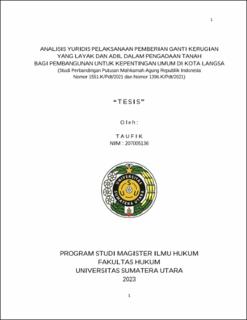| dc.description.abstract | In terms of improving infrastructure for the implementation of development for the public interest, the Government of Langsa City through the Dinas PUPR of Langsa City conducted Land Acquisition for Widening of the Karang Anyer-Gang Kurnia Road, Kecamatan Langsa Baro, Langsa City in 2020, and in the land acquisition process one of them came from a portion of the HGU land owned by PT. Perkebunan Nusantara I. During the deliberations on the form and value of compensation, PT Perkebunan Nusantara I stated "Disagree" with the compensation value offered by the Land Acquisition Executing Committee, because the land value is lower in value from land adjoining and/or lower or below the 2020 Tax Object Sales Value (NJOP), so that the value of the compensation offered is deemed not to meet the "decent and fair" element. In this study, what we want to know is the implementation of determining the value of compensation that is appropriate and fair in accordance with applicable regulations and legal remedies that can be taken by holders of land rights whose land has been assessed by the Appraiser with a value that is considered not to fulfill the element of "decent and fair compensation" ” as well as differences in judges' considerations in the decision of the Mahkamah Agung Republic of Indonesia Number 1551.K/PDT/2021 with Number 1396.K/PDT/2021.
The type of research used in writing this thesis is normative law or normative juridical. The nature of this thesis research is analytical descriptive. The data used as material for analyzing this thesis research is secondary data. The data collection tool in this study will be carried out using library data collection methods (library research). The analysis used by way of qualitative analysis.
The implementation of determining the value of compensation that is appropriate and fair in land acquisition for development for the public interest in accordance with the provisions of the applicable land acquisition laws and regulations is carried out by the Appraiser based on KEPI & SPI, in particular SPI: 204, to obtain a Fair Replacement Value. Furthermore, it becomes the basis for implementing "deliberations" on the form/amount of compensation to the entitled party. In the event that there is no agreement, the party entitled to submit an objection to the local District Court and against the decision of the District Court, there are no appeals, but cassation to the Supreme Court. The Cassation Decision is a final and binding decision for which there is no judicial review available. | en_US |


